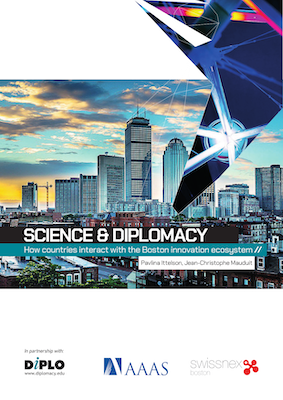Authors: J.C. Mauduit | Pavlina Ittelson
Science & Diplomacy: How countries interact with the Boston innovation ecosystem
2006
Authors: J.C. Mauduit | Pavlina Ittelson
2006

In this paper we aim to provide a comprehensive introduction to the topic of knowledge management in diplomacy. First we provide working definitions of knowledge and knowledge management, and examine the evolution of the concepts. Next, we consider specific features of diplomacy that affect and limit the way knowledge management can be implemented. Then we look at specific techniques which diplomacy can adapt from the business sector in the field of knowledge management. Finally, we consider some important questions related to human resources and knowledge management.

Knowledge and Diplomacy presents papers on knowledge and knowledge management from the January 1999 Conference on Knowledge and Diplomacy in Malta. The papers in this book, examining the topic from a variety of backgrounds, academic interests and orientations, reflect the multidisciplinary character of knowledge management. This publication is only available online.

In this chapter, Walter Fust talks about the role of knowledge management, and knowledge for development, in diplomacy. He describes various methods to assess what knowledge should be stocked, and explains the need for managers who are assigned the task of deciding what should be stocked. These decisions need to be guided by principles, or guidelines - referred to as value management.

In this chapter, John Pace decribes the three-phase evolution of knowledge management in the human rights program of the United Nations. The realisation that knowledge management is a necessity came during the third phase. The author also describes the complex system of monitoring bodies and ad hoc mechanisms, and the developments that took place following four decisions taken in the mid-eighties.

In his paper, J. Thomas Converse focuses on four records-related areas where the issues of knowledge management and diplomacy come together and provide the greatest challenges to archivists, diplomats, historians and technology providers: validation, trustworthiness, context and longevity. He also explores some of the changes and challenges brought about by technology, and urges for a continued embrace of technology, while at the same time demanding the validating and relational functions which give archives their trustworthiness.

In his paper, Richard Falk reflects on the application of information technology on diplomacy, and discusses the challenge of converting information technology to ‘knowledge technology’, and subsequently to ‘wisdom technology’. Yet, the ‘crossroads in human experience’ brings many challenges and dangers which the author analyses.

In his paper, Robert Alston travels through time to rekindle an important highlight – as well as a personal highlight – in the history of knowledge management. His journey takes him back to the 1850s, which saw Antonio Panizzi’s efforts in creating a universal repository of knowledge in the British Museum; and to the 1990s, a time in which he acquired first-hand experience at the same museum, drawing conclusions on the various available ways of navigating large bibliographical and archival databases.

Diplo has a track record of more than 20 years of capacity development in diplomacy. Given the increasing relevance of science diplomacy, expanding our program to include aspects of its theory and practice felt like an organic development. We offered our ten-week Science Diplomacy course for the first time in October 2021.

In his paper, Alex Sceberras Trigona stresses the importance of the diplomatic document as a primary source of diplomatic knowledge, in the light of the distinction between ‘information’ (can be recorded) and knowledge (not easily recorded), the flow of knowledge as information. He then explains the need for dissecting diplomatic documents, and the various level of analysis which are possible, and the effects of digitalisation on knowledge, information and diplomacy.

On Diplo’s blog, in Diplo’s classrooms, and at Diplo’s events, dialogues stretch over a series of entries, comments, and exchanges and may even linger. DiploDialogue summarises. It’s like in sports events: DiploDialogue aims to bring focus by deleting what, in hindsight, is less relevant. In this first DiploDialogue, Katharina Höne and Aldo Matteucci discuss the usefulness of analogies and metaphors for understanding international relations and diplomacy.

Crucial global topics are becoming increasingly dependent on the world’s rapidly changing scientific knowledge and technological capabilities: from global health to digital society, sustainability to development, and beyond. To tackle this growing complexity, countries increasingly seek to engage with international science and technology hubs like Boston, so as to accelerate their ability to innovate and spark collaborative efforts with other nations.

In this paper, Maltese diplomat Gaetan Naudi explains how the Maltese MFA embraced the changes introduced by the informatics era. He looks at such changes from a business management perspective, to show how ICTs were introduced to such a fairly large organisation, the concerns raised by the changes, and the progress on computerised knowledge management. He concludes that despite the positive changes introduced thanks to ICTs, this would not have been possible without human involvement.

Dietrich Kappeler analyses the new approaches for training institutions in knowledge management and diplomatic training, departing from the premise that a distinction is important between personal characteristics and qualities of the diplomat on one hand, and the knowledge and skills he needs to do his job on the other.

In this paper, John Harper and Jennifer Cassingena Harper talk about knowledge as a vital resource, and the necessity of building competencies and establishing new skills. Analysing the theories by Ernst B. Haas in When Knowledge is Power: Three Models of Change in International Organisation, the authors trace the development of knowledge-oriented activities in the private sector, and its implications for organisations in the public and international domain.
Tailor your subscription to your interests, from updates on the dynamic world of digital diplomacy to the latest trends in AI.
Subscribe to more Diplo and Geneva Internet Platform newsletters!
Diplo is a non-profit foundation established by the governments of Malta and Switzerland. Diplo works to increase the role of small and developing states, and to improve global governance and international policy development.
